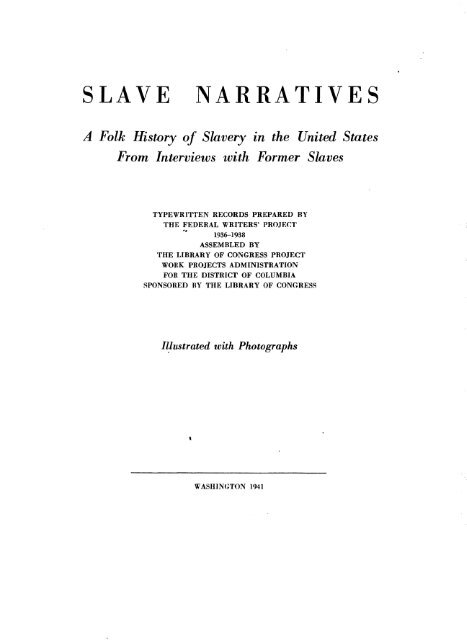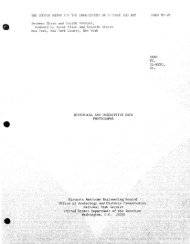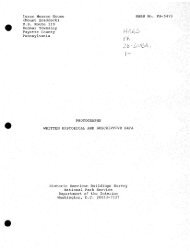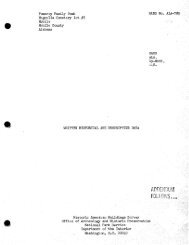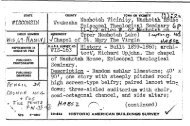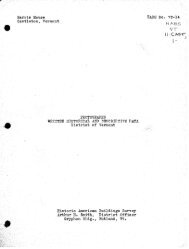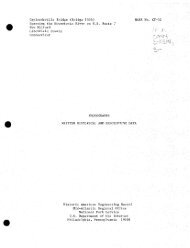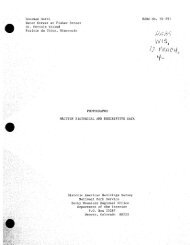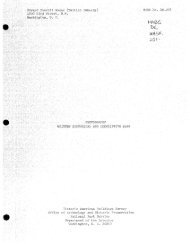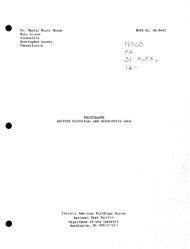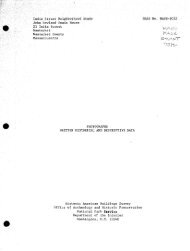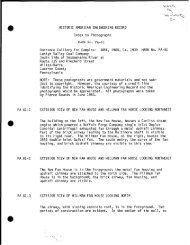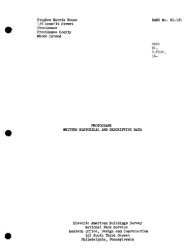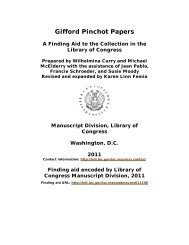ot - Library of Congress
ot - Library of Congress
ot - Library of Congress
You also want an ePaper? Increase the reach of your titles
YUMPU automatically turns print PDFs into web optimized ePapers that Google loves.
VOLU1m IV<br />
GEORGIA NARRATIVES<br />
PART 4<br />
Prepared by<br />
the Federal Writers' Project <strong>of</strong><br />
the Works Progress Administration<br />
for the state <strong>of</strong> Georgia
PLANTATION LIFE AS VIEWED BY AN EX-SLA'V.B<br />
GEORG IA TELFAIR<br />
R.F.D. If 2<br />
Athens, Ga.<br />
,<br />
Writ"ten by: lfiss Grace :MoCune<br />
Athens, Ga.<br />
Edi ted: )[rs. Sarah H. Ha11<br />
Athens, Ga.<br />
and<br />
llrs. Leila Harris<br />
Augusta, Ga.<br />
, f
you an' ax de Lawd to bless you, for you has been so good<br />
an' patient wid me, an' I'se sho' thankful ny son sont you<br />
to se!e me. You done helped me to feel l<strong>ot</strong>s better. Good- .<br />
bye, an'God bless you, an' please :Ma'am, come back to see<br />
IDe again."<br />
******¥******<br />
,<br />
- 9 - 10
·Our Marster evermore did raise d.e c<strong>ot</strong>ton - l<strong>ot</strong>s'"<br />
<strong>of</strong> it to sell, and plenty for cl<strong>ot</strong>hes for all de folkses, white<br />
and black, what lived on his place. All de cl<strong>ot</strong>h was home-made<br />
'cept de calico for de best Sunday dresses. Chillun had to spin<br />
----......<br />
de thread and deir mammies wove de cl<strong>ot</strong>h. 'Fore de end <strong>of</strong> de war, .<br />
whilst I was still so little I had to stand on a box to reach de<br />
spinnin' wheel good. I· could spin six reels a day.<br />
"Ghillun was happy 'fI.Then hog-killin' time come. Us<br />
.warn·'<br />
t 'lowed to help none, 'cept to retch in de wood t a keep de<br />
p<strong>ot</strong> bilin' whar de lard was cookin'. Our Mist'ess allus had de<br />
lard rendered in de bigges' washp<strong>ot</strong> t what dey s at on rocks in de<br />
fireplace. Us didn't mind gittin' de wood for dat, 'cause when dem<br />
cracklints g<strong>ot</strong> done, dey let us have all us could eat and, jus' let<br />
me tell you, Missy, you ain't never had n<strong>ot</strong>hin' good 'less you has<br />
et a warm skin cracklin' wid a little salt. One time when dey was<br />
renderin' lard, all us chillun wascrowdin' 'round close as us<br />
could git to see which one could git a cracklin' fust. Mist'ess<br />
told us to stand back 'fore somebody g<strong>ot</strong> burnt j den Mammy said she<br />
was gwine to take de hides <strong>of</strong>t our backs 'bout gittin' so close to<br />
dat fire, and 'bout. dat time somebody 'hind me gDrume a quick push;<br />
and in de fire I went. Marster grabbed me 'most time I hit dem red<br />
coals, but one hand and arm was burnt so bad I hed to wear it in a<br />
sling for a long time. Den Marster laid down de law and told us<br />
what he would do it' he catch us chillun hangin' t round de fire whar<br />
dey was cookln' lard again.<br />
16
to the President and Secretary or they ran <strong>of</strong>t with the<br />
money so now he just has a sick and accident policy.<br />
Ike will be 94 years old next month. His hair is white,<br />
his eyes blurred with age, but he's quite active tho' he<br />
does walk with a stick.<br />
Ike Thomas<br />
Heidt Bridges Farm near Rio Georgia<br />
September 4, 1936<br />
28
District 7<br />
Mella S. Dixon<br />
-3-<br />
was n<strong>ot</strong> allowed to give his girl !'my form <strong>of</strong> gift, and the efforts <strong>of</strong> sane<br />
girls to secretly receive gifts which they claimed to have "found", were in<br />
vain, for these were taken fram tbem. Atter the proposal, the procedure was<br />
practically the same as is observed today. The consent o'f the parent and<br />
the master was necessary. Marriages were mostly held at n.1ght and no pains<br />
were spared to make them occasions to be remembered and cherished. Beautiful<br />
cl<strong>ot</strong>hes --her own selections --are given the bride, and friends usua.ll.y gave<br />
gifts for the house. 'lb.ese celebrations, attended by visitors 'trom many<br />
plantations, and always by the Toms tamUy, ended in gay"trolics" with cakes,<br />
wine, etc., tor l'$freshments.<br />
Dlring the first year <strong>of</strong> married lite the couple remained with the bride's<br />
m<strong>ot</strong>her who instructed her in the household arts. Dispu.tes between the new1y-<br />
weds were n<strong>ot</strong> tolerated and punishment by the parents 118.8 the result <strong>of</strong><br />
"nagging". At the end <strong>of</strong> a year) an<strong>ot</strong>her log cabin was added to the quarters<br />
and the couple began housekeeping. The moral code 118.8 exceedingly high; the<br />
penalty for <strong>of</strong>fenders - married or single, white or colored - was to be<br />
banished from the group entirely. Thus illegitimate children _re rare enough<br />
to be a novelty.<br />
Young Phil was in his teens when he began his first job - coach driver for<br />
"Gov. It Town.s. '!'his was just before tbay moved to Georgia. He traveled with<br />
him wherever he want, and as the Gov. purchased a plantation in Talb<strong>ot</strong> County,<br />
(the house still stands), and a home in Macon, (the site <strong>ot</strong> Mt. De Sales Academy),<br />
a great deal <strong>of</strong> his time was spent on the road. Phil neftr did any <strong>ot</strong>her work<br />
except to occasionall.y' assist in aweep1Dg the large yard. ':the <strong>ot</strong>her members-QfL
PLANTATION LIFE AS VIEWED BY<br />
EX-SLAVE<br />
JOHN F. VAN HOOK<br />
Newton Bri dge Road<br />
Athens, Georgia<br />
71<br />
Written by: Mrs. sadie B. Hornsby<br />
Area 6 -<br />
Athens -<br />
Edited by: Mrs. Sarah H. Hall<br />
Athens - and<br />
John N. Bo<strong>ot</strong>h<br />
Area Superviso r <strong>ot</strong><br />
Federal Writers'<br />
Project - Areas 6 &. 7,<br />
Augusta, Ga.<br />
Dec. 1, 1938
4. 75<br />
at the breast <strong>ot</strong> a slave woman, but it was all right it the darkey .<br />
was a free woman. After she g<strong>ot</strong> too old to do regular work, Granny<br />
Sarah used to glean after the reapers in the field to get wheat<br />
tor her bread. She had been a favored slave and allowed to do<br />
pretty much as she pleased, and after she was a free woman the white<br />
folks continued to look after her every need, but she loved to do<br />
for herself as long as she was able to be up and about.<br />
"What did we have to eat then? Why, most everything;<br />
ash cakes was a mighty go then. Cornbread dough was made into<br />
little pones and placed on the h<strong>ot</strong> rocks olose to the fire to dry<br />
out a little, then h<strong>ot</strong> ashes were raked out to the front <strong>of</strong> the<br />
fireplace and piled over the ash oakes. When thoroughly done they<br />
were taken out and the ashes washed <strong>of</strong>f; they were just like cake<br />
to us children then. We ate l<strong>ot</strong>s <strong>of</strong> home-made lye hominy, beans,<br />
peas, and all kinds <strong>of</strong> greens, cooked with tat meat. The biggest,<br />
and maybe the best thing in the way <strong>of</strong> vegetables that we had then<br />
was the white-head cabbage; they grew large up there in Carolina<br />
where I lived.<br />
on that farm.<br />
There was just one big garden to feed all the folks<br />
,<br />
"Marse George had a good. 'possum dog that he let his<br />
slaves use at night. They would start <strong>of</strong>f hunting about 10 o'olock.<br />
Darkies knew that the best place to hunt for 'possums was in a<br />
persimmon tree. If they couldn't shake him out, they would cut the<br />
tree down, but the most fun was when we found the 'possum in a<br />
hollow log. Some <strong>of</strong> the hunters would get at one end <strong>of</strong> the log,<br />
and the <strong>ot</strong>hers would guard the <strong>ot</strong>her end, and they would build a fire<br />
to smoke the t possum out. Sometime s when they had to pull him out,
<strong>of</strong> their <strong>ot</strong>her girl. They lived in a two-story frame house that<br />
was surrounded by an oak grove on the road leading from Franklin,<br />
North Carolina, to Clayton, Georgia. Hard Sellars was the carriage<br />
driver, and while I am sure Marse George must have had an overseer,<br />
I don't remember ever hearing anybody say his name.<br />
"Really, Miss, I couldn't say just how 'big that<br />
plantation was, but I am sure there must have been at least four<br />
or five hundred acres in it. One mighty peculiar thing about his<br />
slaves was that Marse George never had more than 99 slaves at one<br />
time; every time he bought one to try to make it an even hundred,<br />
a slave died. This happened so <strong>of</strong>ten, I was told, that he stopped<br />
trying to keep a hundred or more, and held on to his 99 slaves, and<br />
long as he did that, there warn't any more deaths than births among<br />
his slaves. His slaves had to be in the fields when the sun rose,<br />
and there they had to work steady until the sun went down. Oh! Yes,<br />
mam, Marse Tommy Angel was mighty mean to his slaves, but Miss Jenny,<br />
his sister, was good as could be; that is the reason she gave my<br />
m<strong>ot</strong>her to her sister, Miss Ga'line Sellars; because she thought Marse<br />
Tommy was too hard on her.<br />
"1 heard some talk as to how after the slaves had worked<br />
hard in the field all day and come to the house at night, they were<br />
whipped for mighty small <strong>of</strong>fenses. Marse Gecrge would have them<br />
tied hand and fo<strong>ot</strong> over a barrel and would beat them with a cowhide,<br />
or cat-o'-nine tails lash. They had a jail in Franklin as far back
Laney reminded him <strong>of</strong> a song he us ed to sing when<br />
their child was a baby. "It is hard for me to formulate its<br />
words in my mind. I just cann<strong>ot</strong> seem to get them," he answered,<br />
17. 88<br />
"but I thought <strong>of</strong> this one the <strong>ot</strong>her night and promis,ed myself I would<br />
Sing it for you sometime. It's Old Granny Mistletoe.<br />
"Old Granny Mistletoe.<br />
Lyin' in the bed,<br />
Out the window<br />
She poked her head.<br />
"She says, tOld Mau,<br />
The gray goose's gone,<br />
And I think I heard her holler,<br />
King-cant-you-O, King-cant-you-Ol'<br />
"The old fox stepped around,<br />
A mighty fast step.<br />
He hung the old gray goose<br />
Up by the neck.<br />
"Her wings went flip-flop<br />
Over her back,<br />
And he r legs hung down.<br />
Ding-downy-O, ding-downy-O.<br />
"The old fox marohed<br />
On to his den.<br />
Out come his young ones,<br />
Some nine or ten.<br />
"Now we will have<br />
Some-supper-O, some-summer-O.<br />
Now we will have<br />
Some-supper-O, some-supper-O."<br />
"The only riddle I remember is the one about: 'What<br />
goes around the house, and just makes one track?' I believe they<br />
said it was a wheelbarrow. Mighty few people in that settlement<br />
believed in such things as charms. They were too intelligent for<br />
that sort <strong>of</strong> thing.
ligious servie'es until they g<strong>ot</strong> churches <strong>ot</strong> their O\\tl. Those<br />
meetings; were little more than just prayermeetings. Our white<br />
folks were powerful careful to teach their slaves how to do the<br />
right thing, and long after we were tree Mr. Tommy would give long<br />
talks at our meetings. We loved to listen to him and have him<br />
interested in us, tor we had never been treated mean like heaps <strong>ot</strong><br />
the Slaves in that neighborhood had.<br />
21. B2<br />
·One white man in our county needed the help <strong>of</strong> the Lord.<br />
His name was Boney Ridley and he just couldn-t keep away from liquor.<br />
He was an uncle <strong>of</strong> that famous preacher and poet, Mr. Caleb Ridley.<br />
One day when Mr. Boney had been drinking hard and kind <strong>ot</strong> out <strong>of</strong><br />
his head, he was stretched out on the ground in a sort <strong>of</strong> stupor.<br />
He opened his eyes and looked at the buzzards circling low oyer him<br />
and said, sort <strong>of</strong> sick and fretful-like, 'Git on <strong>of</strong>t, buzzards; I<br />
ain't dead yet. 1ft<br />
"The Reverend Doctor George Truett was a tine boy and<br />
he has grown into a splendid man. He is one <strong>of</strong> God's chosen ones.<br />
I well remember the first time I , heard him speak. I WSB a janitor<br />
at the state Normal School when he was a pupil there in 1887. I<br />
still think he is about the greatest orator I ever listened to. In<br />
those days, back in 1881, I always made it convenient to be doing<br />
something around the school roam when time came for him to reoite<br />
or to be on a debate. After he left that school he went on to the<br />
Seninary at Louisville and he has become known throughout this<br />
country as a great Christian.
Driskell<br />
JWL 10-1.2-3'1<br />
Rascal."<br />
Following is Mr. william Ward'. description <strong>of</strong> the bed called "The Grand<br />
"De beds dat al1. 0' de slaves slept in wus called 'Grand. Rascals'. Dey wus<br />
,<br />
made on de same order as a box. De way dey made 'ern "us like dis: dey took four<br />
strips <strong>of</strong> narrow wood, each one <strong>of</strong> 'em 'bout a fo<strong>ot</strong> wide,an' den dey nailed 'em<br />
together so dat dey wus in de shape <strong>of</strong> a square. Den dey nailed a b<strong>ot</strong>tom onto<br />
dis square smpe. Dis b<strong>ot</strong>tom ws called de slats. When. dis wus finished dey set<br />
dis box on same legs to keep it <strong>of</strong>f'n de floor, an' den dey g<strong>ot</strong> busy wid de<br />
mattress. Dey took 01' oat sacks an' filled 'em wid straw an' bal" an' den dey<br />
put dis in de box an' slept on it. Dare wusn't no springs on dese bunks an'<br />
everybody bad a hard time sleepin'.<br />
"De reel-l'e&l name <strong>of</strong> dese wus 'Sonova-Bitches' but de slaves called 'em<br />
'Grand Rascals' 'cause dey .didn't want people to hear 'em use a bad ward.<br />
"Attar Sher.man come through Atlanta he let de slaves go, an' When he did.<br />
me an' some <strong>of</strong> de <strong>ot</strong>her slaves went back to our 01' masters. 01' man Gov. Brown<br />
wua my boss man. After de war wus over 01' man Gordon took me an' some <strong>of</strong> de <strong>ot</strong>hers<br />
out to Mississippi. I stayed in peonage out dare tel" 'bout forty years. I WU,s<br />
,<br />
located at jes' 'bout forty miles south <strong>of</strong> Greenwood. an' I worked on de plantations<br />
<strong>of</strong> 01' man Ssra Jones an' 01' man Gordon.<br />
"I couldn't git away 'cause dey watched us wid guns all de time. When de<br />
levee busted dat kinde freed me. Man, dey ws devils; dey wouldn't 'low you to go<br />
nowhere --- n<strong>ot</strong> even to church. You done good to g1 t sunpin' to eat. Dey wouldn't<br />
give you DO cl<strong>ot</strong>hes, an' if you g<strong>ot</strong> wet you jes' had to lay down in whut you g<strong>ot</strong><br />
wet .in.<br />
"An' , man, dey would whup you in spite <strong>of</strong> de deVil. You had to ask to git<br />
water --- if you didn't dey would stretch you 'cross a barrel an' wear you out.
-- 100220<br />
PL.ANTATION LIFE AS VIEWED BY AN EX-SLAVE<br />
GREEN WILLBANKS<br />
347 Fairview Street<br />
Athens, Georgia.<br />
Written by: Mrs. Sadie B. Hornsby<br />
Athens -<br />
Edited by: Mrs. Sarah H. Hall<br />
Athens - and<br />
John N. Bo<strong>ot</strong>h<br />
District Supervisor<br />
Federal Writers' Proje<strong>ot</strong><br />
Residenoies 6 & 7<br />
Augusta, Georgia<br />
sept. 19, 1938
causes were the real ones. Be that as it may, Aunt Adeline is a very re-<br />
markable old woman and is most interesting to talk with.<br />
page 7. 167
a success.<br />
]lage 2.<br />
Thus passes, to a sure reward, MAmmv ---v Dink. • W h ose life was such<br />
;J1al'hf?l'j A'/;,11'" d,etl Sa7u Y' d V 17.10/..;-;-<br />
11 ec: - {15ft, /9'';;;;
5 225<br />
"And you say the woman went to visit him?"<br />
"Yes, Ma'm. De woman would go dere in de woods wid him. Finally one<br />
night when he was outer de swamp he had to lie hidin' in de ditch all night,<br />
cross from de nigger hospital. Den somebody crep' up and sh<strong>ot</strong> him, but he<br />
didn't die den. Dey cay'ed his crost to de hospital and he die three days<br />
later."<br />
"What about church? Did you go to church in those days?"<br />
"Yas'm, we used to go to town. But de padderolas wus ridin' in dem<br />
days, and you couldn't go <strong>of</strong>f de plantachun widout a pass. So my boss he<br />
build a brick church on de plantachuhn, and de D'Laigles build a church on dere's."<br />
"What happened if they caught you <strong>of</strong>f without a pass?"<br />
"If you had no pass dey ca'y you to de C<strong>ot</strong>e House, and your marster hadder<br />
come git you out."<br />
"Do you remember anything about the Yankees coming to this part <strong>of</strong> the<br />
country?"<br />
At this her manner became quite sprightly, as she replied, "Yas'm, I seen<br />
'em comin' down de street. Every one had er canteen on he side, a blanket on<br />
his shoulder, caps cocked on one side de haid. De cavalry had bo<strong>ot</strong>s on and<br />
spurros on de bo<strong>ot</strong>s. First dey s<strong>ot</strong> de niggers free on Dead River, den dey<br />
come on here to s<strong>ot</strong> us free. Dey march straight up Broad Street to de Planters'<br />
H<strong>ot</strong>el, den dey camped on Dead River, den dey XXXXXXXXXXXXXXX camped on<br />
de river. Dey stayed here six months till dey s<strong>ot</strong> dis place free. When dey<br />
campin' on de river bank we go down dere and wash dey clo'es fer a good price.<br />
Dey had hard tack to eat. Dey gib us de hard tack and tell us to soak it in<br />
Water, and fry it in de meat gravy. I ain't taste n<strong>ot</strong>hing so good since.<br />
Dey say, 'Dis hard tack whut we hadder lib on while we fightin' to s<strong>ot</strong> you free."
RACHEL SULLIV-. 1327 Reynolds street, Augusta, Ga.; Born 1852.<br />
,<br />
We round Rache1 Sulll van sitting on the porck <strong>of</strong> a two :room. house<br />
on Reynolds Street. She is a large, fl.eshy wanan. Her ha.n.cl.made yellow<br />
')t)r'<br />
'W,'_''\.)<br />
homeS]?un was baggy and sCliled, and har feet were bare, though her shoes were<br />
beside her roeker.<br />
We approached her cautiously. ' "Auntie, we heard you were one <strong>of</strong> the<br />
slaves who used to live on Governor Pickens t place aver near Edgefield."<br />
"Yastm, Yastm. 1 shore Wtls. He gin us our ehuteh. - de one over<br />
yonder on de Edgefield road. N<strong>ot</strong>m you can't ,.see it fum de road. You has<br />
to cross de creek. Old Karster had it pulled out de low ground under de<br />
bRaSh arbor, and set it dere."<br />
"And what did you do on the plantation, Auntie?"<br />
"I wus a nu's gal, 'bout 'leben years old. I nu'sed my Auntie's<br />
chill.un, while she nu'sed de lady's baby whut come from Russie. wid de Marster's<br />
Wife - nutsed dat baby :rum de breas's I mean. All de white ladies had wet<br />
nusses ih dam days. Her master had just returned from Russia, where he had<br />
been embassador. Her baby had the czarina far a gocrm<strong>ot</strong>her."<br />
around."<br />
"And so you used to look after you aunt's children?"<br />
"Yas'm. I used to play wid 'em in de big ground wid de monuments all<br />
,<br />
"Miss Lucy Holcome was Governor Pickens' second wife, wasn't she?"<br />
"M.lsta wus', ma tm."<br />
"And ••• ,- were you born on the pl.antation at Edgefield?"<br />
"1 wus born at Ninety-six. Log Creek place .... ,. was Earste':"s second<br />
place. Oh, he had plantachuns everywhere, clear over to Alabama. He had<br />
overseers on all,de places, rra'm."
ehind it to cleanse the blood.<br />
Dog fern is good for colds and fever; boneset tea<br />
w ill serve the same purp a se •<br />
Catnip tea is good for measles or hives.<br />
If your right shoe comes unlaced, someone is<br />
saying good things about you; left shoe - bad things.<br />
If a chunk <strong>of</strong> fire fa.lls from the firej)lace a<br />
visi tor is coming. If the chunk is short and la.rge<br />
the person will be short and fat, etc.<br />
Don't buy new things for a sick person; if you do<br />
he will n<strong>ot</strong> live to wear it out.<br />
If a. lJerson who ha.s money dies without telling<br />
where it IS, a friend or rela.tive can find it oy<br />
going to his grave three nights in succession and<br />
throwing stones on it. On the foul'th night he IYlUSt;<br />
go alone, and the person 'will te 11 him where the<br />
,<br />
money is hidden.<br />
If a witch rides you, put a sifter under the bed and<br />
he will have to c.ount the holes in the sifter before<br />
he Goe s ou t, thus giving you time to ca toh him.<br />
Starch your sweetheart's handkerchief and he will<br />
love you [Jore.<br />
Dont t give your sVleetheE,rt a knife. It will cut your<br />
love in two.<br />
4. 280
If it rains while the sun is shining the devil<br />
is beating his wife.<br />
To bi te your tongue vlhile talking is a sign that<br />
you have told a lie.<br />
Persons with gaps between their front teeth are<br />
big li8.rs.<br />
Cut your finger nails on Monday, you cut them for neVis;<br />
eu t them on Tue sday, get a new pair <strong>of</strong> shoe s;<br />
Cut them on ',;'fedl1Gsday, you cut them for wealth;<br />
Out them on Thursday, you cut them for health;<br />
Cut them on Frida.y, you cut them for sorrow;<br />
Cut them on Saturday, see your sweetheart tomorrow;<br />
Cut them on Sunday, its sa.fety to seek;<br />
ilut the devil will have you the rest <strong>of</strong> the week.<br />
If you start some place and forget sODething don't turn<br />
8,round without making a. cross I:'lark and 3pitting in it,<br />
if you do you will have bad luck.<br />
To stumli your right fo<strong>ot</strong> is good luck, but to stump your<br />
left fo<strong>ot</strong> is -ba.d luck. To prevent the -oad Iltck you r.ru.st<br />
,<br />
turn around three times.<br />
It is bad luck for a black ca.t to cross you to the left,<br />
but good luck if he crosses you to the right.<br />
If a Dicture <strong>of</strong> a person falls <strong>of</strong>f the '117al1 it is a sign<br />
<strong>of</strong> death.<br />
To dream <strong>of</strong> crying is a sign <strong>of</strong> trouble.<br />
To dream <strong>of</strong> dancing is a sign <strong>of</strong> happiness •<br />
....,.:--<br />
5· 2tj7
To wear a. dime a.round your a.nkle will. ward <strong>of</strong>f wi tch<br />
craft.<br />
To put a silver dime in your EJOU th vIill de termine<br />
whether or n<strong>ot</strong> you have been bewitched. If the dime<br />
turns -bla.ck, s orne one ha.s bewi tched you, but if it<br />
keeps _i ts color, no one has l)ewi tched you.<br />
To take a strand <strong>of</strong> a person's ha.ir and nail it in<br />
a tree will run that person crazy.<br />
If a. rooster crows on your back stells you may look<br />
for a stranger.<br />
Chinaberries are good for ..... lormy children.<br />
The top 0 f a pine t re e a. nd the to,i) 0 f a. cedar t re e<br />
9laced over a large coal <strong>of</strong> fire, just enough to<br />
make 8. good smoke, 'will cure chillblain' feet.<br />
7. 2tj9
t00152 -1-<br />
There are many ex-slaves living in Richmond County and<br />
Augusta who ha.ve vivid recollections <strong>of</strong> the days when their lives<br />
were inse1,)arably bound to those <strong>of</strong> their masters. These people<br />
have a past rich in tradi tion ant sentiment, and the ir memories<br />
<strong>of</strong> customs, habits <strong>of</strong> work al).ct. play, and the superstitious beliefs,<br />
ii/hich still govern their actions to a large extent weave: a color-<br />
ful pattern in local history.<br />
Mistreatment at the hands <strong>of</strong> their masters and the watch-<br />
dog overseers is outstanding in the memory <strong>of</strong> most <strong>of</strong> them. "When<br />
I was in sla.very, us ha.d what you call good white folk. They wax-n't<br />
rich by no means, but they wa.s good. Us had rather have tem poor<br />
and good than rich and mean. Plenty <strong>of</strong> whi te folk mistrea.ted they<br />
slaves, but ours never Inistrea.ted us. They was a man lived in<br />
callin' distance, on the next l)lantation, who worked his slaves<br />
da.y and night and on Sunday for a rarety. You could hear' em<br />
coming from the field about 12 0' clock a.t night, a.nd they ha.d to<br />
be back in the fields by daylight. They couldn't get <strong>of</strong>f on Satur-<br />
da.y nights like everb.ody else. Whenever he bought their cl<strong>ot</strong>hes,<br />
it was on Sunday whep they warn't workint. He Vias mean, but he<br />
\78.S good about buyin' for 'em, new shoes or a. suit or-anything<br />
<strong>of</strong> the like they said they needed.<br />
ItMars ter had ove rseers, but he wouldn't le t t em whip his<br />
sla.ve s unmerc iful. They a.lwa.ys whilJped us jus t a.s your mamas whips<br />
you now.<br />
"Bob Lampkin was the meanest slave owner I ever knowed.<br />
He would beat his slaves and everybody elsets he caught in the road.<br />
291
Vias dead. He had the slave s take her dov/n and bury her in a box.<br />
He said that laziness had killed her and that she warn't worth<br />
the box she wa.S buried in. The babies died the next day and he<br />
said he was glad <strong>of</strong> it 'cause they would grow up lazy just like<br />
their m<strong>ot</strong>her.<br />
liMy rnarster had a. barrel wi th nails drove in it that<br />
he would put you in when he couldn't think <strong>of</strong> n<strong>ot</strong>hin' else mean<br />
.<br />
enough to do. He would l1ut you in this barrel and roll. it down<br />
a hill. When you g<strong>ot</strong> out you would be in a bad fix, but he didn't<br />
c'are. Sometimes he rolled the b.arrel in the river and drowned his<br />
slave s.<br />
"1 had a br<strong>ot</strong>her who worked at the academy and every<br />
night when the teacher had<br />
, .<br />
IllS class he would le t my br<strong>ot</strong>her come<br />
in. He taught him to read and write too. He learned to read and<br />
vlri te real well and t.he teacher said he was the smartest one in<br />
the class. Mar-ster passed our window one night and heard him<br />
readint. The next mornin' he called him over to the house and<br />
fooled him into readint and writint, told him he had somethin' he<br />
wanted him to do if' he could read and wri te good enough. My<br />
br<strong>ot</strong>her read everythint mars ter give him a.nd vrr<strong>ot</strong>e with a pencil<br />
a.nd ink pen. Marster was so mad that he could rea.d and wr-i te<br />
better than his own boy that he beat him, took him away from the<br />
academy, and 'put him to Vlork in the blacksmith shop. Marster<br />
wouldn't Ie t him '!lear no shoe s in the shop 'cause he wanted the<br />
h<strong>ot</strong> cinders to fallon his feet to punish him. V{hen the man in<br />
charge <strong>of</strong> the snop told marster he Vlouldn't work my -or<strong>ot</strong>her unless<br />
he had on shoes, he bought some br·ogans that he knowed he coul.dn't<br />
wear, and from then on he made him do the harde st kind <strong>of</strong> work he-<br />
.. 6:<br />
fi<br />
I<br />
297 1 ;<br />
i.<br />
I<br />
r"
.<br />
"-rust before freedom declared, my husband t'ook very<br />
sick and she took her husband and come to my house to make him<br />
get up. I told her that he was net able to work, but my husband<br />
vias so scared they would beat me to death t til he bagged me to<br />
hush. I expeat mar-ster-would have if he hadn't been scared <strong>of</strong><br />
his father. You see his father give me to him. He told me if<br />
the legisla.ture set in his behalf he would ma.ke me know a niggerfs<br />
place. You know it was near-freedom. I told him if he made my<br />
husband get out <strong>of</strong> bed as sick as he was and go to work, I would<br />
tell his father if he killed me afterwards. And that's one time<br />
I was goin' to fight with t em• I never was scared <strong>of</strong> none <strong>of</strong> 'em,<br />
so I told tern if they touched my husband they wouldn't touch<br />
n<strong>ot</strong>hin' else.' They wouldntt give us n<strong>ot</strong>hint to ea.t that whole day.<br />
·Course we never did have much to eat. At night they<br />
would give us a teacup <strong>of</strong> meal and a slice <strong>of</strong> bacon a piece for!<br />
breakfus' the next IJornint. If you had chillun they would give<br />
you a teacup <strong>of</strong> meal for two chillun. By day light the next<br />
mornin' the oversebr was at your' hou.se to see if you was out, and<br />
, \<br />
if you hadn't cooked and eat and gt out <strong>of</strong> that house he would<br />
ta.ke tha.t bull whip, and whip you nea.rly to death. He carried.<br />
that bull whip wi th him eVerY'Nhere he went.<br />
I!f!.<br />
ItThose folks killed one <strong>of</strong>/husband's br<strong>ot</strong>hers. He was<br />
kind <strong>of</strong> crack-brained, a.nd I cause he was half crazy, they beat him<br />
a.ll the time. The last time they beat him we was in the field and<br />
this overseer beat him wi th that bull hide all across the head<br />
and eve rYV/he re • He beat him until he fell down on his knees and<br />
couldn't even say a word. And do you know he wouldn't even le t<br />
a one. <strong>of</strong> us go to see about him. He stayed stretched out in the<br />
-9 ... 30(.)
the field 'til us went home. The next mornin' he was found dea.d<br />
right where he had b·eat him that evenin'.<br />
tUB-out two or three weeks later than that they told one<br />
<strong>of</strong> the slaves they wa.s goin' to beat him after we quit work that<br />
. ,<br />
evenln • His name was Josh.<br />
"When the overseer went to the <strong>ot</strong>her end <strong>of</strong> the field<br />
Josh dropped his hoe and walked <strong>of</strong>f. Nobody saw him anymore for<br />
abou t three weeks. He was the best hand us had a.nd us sh<strong>ot</strong> did<br />
need him. Our master went everywhere he could think <strong>of</strong>, lookint<br />
for Josh, but he couldn t t find him and Vie wa.s glad <strong>of</strong> it. After<br />
he looked and looked and couldn't find him he told all <strong>of</strong> us to<br />
tell Josh to come back if we knowed where he was. He said if Josh<br />
Vlould come ba.ck he wonldn't whip him, wouldn t t ·let the oVf3rseer<br />
whip him. My husband knowed where he was but he warntt gain' to<br />
tell nob;ody. Josh would come to our house every night and us<br />
would give him some <strong>of</strong> wha.t us had for dinner and sup'per. Us<br />
always saved it for him. Us would eat breakfus' at our house, but<br />
all <strong>of</strong> us et dinner and supper at the mess house together. , Every-<br />
day when I et dinner and sUPl)er I would take a l)art <strong>of</strong> mine and my<br />
husband would take a part <strong>of</strong> his and us Vlould carry it to our<br />
house for pore Josh. tRout' leven o· clock at night, when everybody<br />
Vias sleep, Josh would come to the side window and get what us ha.d<br />
for him. It's really a shame the way tpa t i)ore man had to hide<br />
a"Oout just to keep from bein' beat to death 'bout n<strong>ot</strong>hin'. Josh<br />
said the first day he left he went in the woods and looked and<br />
looked for a l)lace to hide. I.e. ter he saw a. tree tha t the VI lnd<br />
had blowed the top <strong>of</strong>f and left 'bout ten feet standint. This<br />
was rathsr a big tree and all <strong>of</strong> the insides had ·r<strong>ot</strong>ted out. I<br />
-1.0- 301·
didn't see them whippint any women there, so I can't sp,y they did<br />
and I can't say they didntt.<br />
"My master wouldn't let us go to school, but his chillun<br />
would slip 'round and teach us what they could out <strong>of</strong> their books.<br />
l'hey \-'{ould also give us books to read.VThenever their p80 or rna<br />
-14- 305.!<br />
caught them tryint to teach us they always whipped them. I learneQ<br />
to read and viri te from t em and It 11 never forge t how hard it was<br />
for 'em to get a chance to teach me. But if they caught you tryin'<br />
to write they would cut your finger <strong>of</strong>f and if they caught you again<br />
they would cut your head <strong>of</strong>f.<br />
UWhen I was a young man ,8. old lYJan stole the head and<br />
pluck (pluck js the liver and lites) out <strong>of</strong> the hog lsome peoJ;Jle<br />
call it the haslet) and hid it up in· the l<strong>of</strong>t <strong>of</strong> his house. When<br />
I<br />
his .!Jarster missed it he went to this man's house J.ookin' for it.<br />
The r:1an told him that he didn't have it. He had already told hi s<br />
vlife if his !;;arster corne n<strong>ot</strong> to own it ei there Well his master<br />
kept askin' him ovel" and over 'b.out the head and pluck, but they<br />
denied having it. The marstar told' em if they didn't give it to<br />
him and that quick ,he was goin' to give 'em a. thoLlsand lashe s ea.ch,<br />
if less didn't kill tern. This woman's husband told her n<strong>ot</strong> to own<br />
it. He told her to take three thousand lashes and don't oVin it. So<br />
their rnarster whipped her and whipped her, but she wouldn't own it.<br />
Finally he qui t "\"hippin' her and starte d whippin' the old man. Just<br />
a.s soon as he started v/hippin' the I!lan he told his wife to go up in<br />
the l<strong>of</strong>t <strong>of</strong> the house a.nd throVi the hea.d a.nd .rluck dOVln 'ca.use he<br />
didn't want it.
had fooled tern for seven years, but he wouldn't fool 'em seven<br />
J::lOre. When they sta.rted to gra.b him he just reached in the fire<br />
and g<strong>ot</strong> a piece <strong>of</strong> wood tha.t was burnin' good on one end and<br />
waved it all a.round (in a circle) until he set three <strong>of</strong> 'em on<br />
fire. While they was puttin' this fire out he run out in the<br />
swamp and ba.ck in his cave. They tried to catch him again. They<br />
pa.inted their faces and done just like they did the first time,<br />
but this time they c8.rried .pistols. When they pulled their pistols<br />
on him he did just like he did the first time, and they never did<br />
catch him. He stopped comin' to p.la.y for the. dances after they<br />
was stra.ight a.fter him. Dogs coul.dn't trail him t c·ause he kept<br />
his feet rubbed wi th onions.<br />
Itl have seen some ma.rs te rs make the ir slaves walk. in<br />
be<br />
snow knee deep, bare f 0 ate d • Their heels would/cracked open jus'<br />
like corn brea.d.<br />
"The only rea,l mean thing they did to us when I was young<br />
VIas to sell my father when our marster died. They sold him to<br />
somebody wa.y <strong>of</strong>f, and they promised to "br·ing him back to I see us,<br />
but they never did., We always wished he v{ould come, but until<br />
this day us ha.sn't laid eyes on him again. My m<strong>ot</strong>her worried tbout<br />
him 'til she died.<br />
ttChillun didn't knoW" wha.t shoes wa.s 'til they was 'bout<br />
fifteen yea.rs old. They would go a mile or a mile and a half in<br />
the snoVl for wa.ter anytime, and the only thin' they ever ha.d on<br />
their feet would "be somethint ma.de out <strong>of</strong> home-spun. You don't<br />
hardly hear <strong>of</strong> chilblain feet now, but then most every child you<br />
saw ha.d cra.cked heels. The first pair <strong>of</strong> shoe s I ever wore, I was<br />
sixteen yea.rs old, wa.s too small for me and I pulled 'em <strong>of</strong>f and<br />
throwed t em in the fire."<br />
-1.6- 307<br />
.
Page S.<br />
light hazel and her hair flutfs about her faoe in .<strong>ot</strong>t ringlets<br />
instead <strong>of</strong> the tight kinks <strong>of</strong> the pure !legro • ...<br />
"My father was a white ma.n, de overseer, It said Sarah.<br />
ItLeastvJays, dey laid me to him."<br />
Sarah was brought up like the I.lgl'o ohildren on the plan<br />
tation. She had no hard work to do. Her m<strong>ot</strong>her w,as a field hand,<br />
and they lived in a 11 ttle house in the quarters. "De vety :rust<br />
thing I kin remember is ridint down de road in de ox cart wid<br />
my raa.InIlW, tt she said. "Ole man Eli \VUe drivin'. ':/e wus goin'<br />
to Miss Meg's on de odder side 0' Hart's Branch. 11arster had<br />
give us to Miss Meg when she married 1U'. Obediah Cloud."<br />
HOusnn COl'IDlTIONS<br />
The slave houses were oalled IIquartersRJ whioh consisted<br />
generally <strong>of</strong> a double row or houses facing each <strong>ot</strong>her ill a grove o'f<br />
trees behind the ttbig hou se." On prosperous plantations each <strong>ot</strong><br />
f<br />
these oabins\he.d a garden pl<strong>ot</strong> and a ohicken yard. Som.e <strong>of</strong> them.<br />
were built <strong>of</strong> logs, but many were <strong>of</strong> planks, Most <strong>of</strong> them were large,<br />
one-room, u:n.ceiletl, with open fireplaoes at one end for oooking.<br />
'iilien families &'ew too large a shed room would be "drap down on<br />
de back. ff An<strong>ot</strong>her type <strong>of</strong> slave cabin was called the ItDou ble-<br />
pen" house. This was a large two-roam cabill, with a chimney be-<br />
tween the two roome, and accommodating tVI0 families. On the more<br />
31()
Page 10<br />
mas ter to school, said he "larned something then. I g<strong>ot</strong> way up<br />
in my A B Cs, but a.ttar I g<strong>ot</strong> to thinkint 'bout gals I fergit all<br />
t b au t d at. fI<br />
An<strong>ot</strong>her slave said, "We had a school on our plantation and<br />
a. Negro teacher named, Mathis, but they couldn" t make me learn<br />
n<strong>ot</strong>hin' • I sure is sorry noYi. tt<br />
Easter Jones, who was once a slave <strong>of</strong> Lawyer Bennet, on a<br />
plantation about ten miles from Waynesboro, said, when we asked<br />
if she had been to school, "Chillun didn't know whut a book wus in<br />
dem days--dey didn't teach tern n<strong>ot</strong>hin' but wuk. Dey didn'learn<br />
me n<strong>ot</strong>hint bu t to churn and clean up house, and 'tend to da,t boy<br />
and spin and cyard de roll."<br />
RELIGIO!<br />
MOst <strong>of</strong> the ex-slaves interviewed received their early re-+<br />
ligious training in the churches <strong>of</strong> their masters. Many churches<br />
Which have slaVe sections in this district are still standing.<br />
Sometimes the slaves , sat in pews partitioned <strong>of</strong>f at the back <strong>of</strong><br />
the church, and sometimes there was·a gallery with a side entrance.<br />
The old Bath Pre sbyterian Church had a. gall.ery and pri va te<br />
entrance <strong>of</strong> this kind. SUnday Schools were <strong>of</strong>ten conducted for<br />
the· slaves on the plantation.<br />
Among the ordinances passed by the City <strong>of</strong> Augusta, February<br />
7" 1862, was section forty-seven, which concerned negro preaching<br />
and teaching,<br />
"No slave or free person <strong>of</strong> color shall be allowed to preach,<br />
318
By, 1845 there were many laws on the statute boaks(>f Ge.orgia<br />
concerning the duties <strong>of</strong> patrols. The justi ce <strong>of</strong> the' peaoe in each<br />
captain's district <strong>of</strong> the state was empowered to decide who WaS<br />
eligible to patrol duty and to appoint the pa.trol. Every member<br />
<strong>of</strong> the patrol was required to carry a pistol while on duty. They<br />
were required to arrest all slaves found ou tside their master's<br />
domain wi tbout a pass, or who was n<strong>ot</strong> in company wi th some whi te<br />
person. He was empowered to whip such slave wi th twenty laehes.<br />
He a,l so had power to sea.rch for· <strong>of</strong>fensive weap ons and fugi ti,ve slaves.<br />
EVery time a person evaded patrol du ty he was requi red to pay,the<br />
sum <strong>of</strong> five dollars fine.<br />
The entire life <strong>of</strong> the slave was hedged about with rules and<br />
re.gulatj,ons. Beside those passed by individual ma.sters fo!' their<br />
own plantations there Were many city and state laws. Severe pun-<br />
i shrnent, such as whipping on the bare skin, was the exception rather<br />
than the rule, though some slaves have told <strong>of</strong> treatment that waS'<br />
,<br />
actually inhuman.<br />
In 184, the following , laws had been'J;Jassed in . Georgia., the<br />
'riolation <strong>of</strong> which brought the death-penaltYI<br />
"Capita.l crimes when punished with death: The following<br />
shall be considered a.s caPi tal <strong>of</strong>fenses, when commi tted by a, slave<br />
or free person <strong>of</strong> colorr insurrection or a.n attempt to excite it;<br />
commi tting a rape, or attempting it on a free whi te female; murder<br />
<strong>of</strong> a. free whi te person, or murder <strong>of</strong> a slave or free person <strong>of</strong><br />
color, or poisoning a human being; every and each <strong>of</strong> these <strong>of</strong>fenses<br />
shall, on conviction, be punished with death.-
Fage 16<br />
or free person <strong>of</strong> color .Was actually engaged in the business <strong>of</strong> said<br />
owner or employer, the said slave or free persen <strong>of</strong> color shall be<br />
convicted and :punished by whipping, n<strong>ot</strong> to exceed 39 la.shes, which<br />
puni shmen t in no case be commu ted by a, fina.<br />
"It shall be the duty <strong>of</strong> the <strong>of</strong>ficer making the arrest <strong>of</strong><br />
such slave or free person <strong>of</strong> color as a,foresaid, to take into his<br />
possession the horse or horse and vehicle. or torses and vehicles,<br />
sO used by such slave or free parson <strong>of</strong> color, which property may<br />
be redeemed by the owner, if white, upon the payment <strong>of</strong> $10.00,<br />
and if the owner <strong>of</strong> such property is a slave or free person <strong>of</strong><br />
color, he or she shall be punished by whipping n<strong>ot</strong> less than 15<br />
lashes."<br />
"No slave or free person <strong>of</strong> color sha11 be a110wed to attend<br />
military parades, or a.ny procession <strong>of</strong> citizens, or at the market<br />
house on public sale days under the penalty <strong>of</strong> receiving n<strong>ot</strong> ex<br />
ceeding 15 lashes, for each and every <strong>of</strong>fense, to be inflicted by.<br />
the Chief <strong>of</strong> police, Cap tain or any lieu tenan t; provided no person<br />
shall be prevented ,from ha.ving the attendance <strong>of</strong> his own servant<br />
on such occasions."<br />
"No slave or free person <strong>of</strong> color shall walk wi th a cane,<br />
club, or stick, except such slave or free person <strong>of</strong> color be blind<br />
or infirm; nor smoke a pipe or cigar in any street, lane, alley<br />
or <strong>ot</strong>her public place, under a penalty <strong>of</strong> n<strong>ot</strong> exceeding 25 lashes,<br />
to be inflicted by s.ny <strong>of</strong>ficer <strong>of</strong> the Ci ty, by orde r <strong>of</strong> the<br />
Recorder's Court. at<br />
------------- .
EtULES OF THE PLANTATION<br />
1"). Page 240. 3.3(1 ,<br />
Rule 1st. The overseer will n<strong>ot</strong> be expected to work in the crop,<br />
"but he must consta.ntly with the hands, when n<strong>ot</strong> <strong>ot</strong>herw·ise engaged<br />
in the employer's business, and will be required to attend on<br />
occasions to any pecuniary transa.ctions connected wi th the planta-<br />
+ .<br />
"lOn.<br />
Rule 2nd. The OVerseer is n<strong>ot</strong> axpected to be absent from the planta-<br />
tion unless actual necessity compels him, Sundays excepted, and<br />
then it is expected that he will, on all occasions, b3 e,t home by<br />
night.<br />
Rule 3rd. He will attend, morning, noon and night, at the stable,<br />
and see that the mUles g,nd horses are ordered, curried, and fed.<br />
Rule 4th. He will see that e7ery negro is out by daylight in the<br />
mo:cning--a. signa.l being given oy a olast <strong>of</strong> the horn, the first horn<br />
will be blown half an hour befo_"e day. He will alsO visit the<br />
negro cabins at least once or twice a weak, at nisht, to see that all<br />
are in. No negro must be out <strong>of</strong> his house after ten oclock in.<br />
summer and eleven\in winter.<br />
Rule 5th. The OYe.r:aeer is n<strong>ot</strong> to give passes to the negroes<br />
\vithout the employer's consent. The families the negroes a.re allowed<br />
to visit will be specified by the employer; a.lso those allov,red to<br />
vi si t the p remi ses. Nor is any negro a.llowed to vi si t the pls,ce<br />
vrithout showing hir'!self to the employer or overseer.<br />
Rule 6th. The overseer is required n<strong>ot</strong> to chat with tt.e negroes,<br />
except on business, nor to encoura.ge tale bearing, nor is a.ny ta,le
they wore several waists and seemed absolutely unaware <strong>of</strong> the<br />
heat.<br />
Page 45.<br />
One man, wearing the typi cal dress <strong>of</strong> the poverty-stricken<br />
old person <strong>of</strong> this distri<strong>ot</strong>, is Tim Thornton, lIDO \lsed to live<br />
on the Virginia plantation <strong>ot</strong> Mrs. LaVinia Tinsley. His ragged<br />
pants are sewed up.1i th oord, and On his coat nails are used where<br />
buttons used to be. In the edges <strong>of</strong> his "salt and llepper l1 hair<br />
are stuck matChes. convenient for lighting his pipe. IUs beard<br />
is bushy and his lO'lIar lip pendulous and long, showing strong<br />
yellow teeth. His manner is kindly, and he i8 Imown as "Old<br />
Singing Tim" because he hums spirituals all day long as he stumps<br />
around to,.-m. leaning on a stiok.<br />
NUMBER OF SUVES,<br />
Plantations owned by Dr. Balding :.liller in Burke County<br />
had about eight hundred slaves. Governor Pickens <strong>of</strong> South<br />
Carolina was said to have had abou.t four hundred on his various<br />
plantationB;l The William :.jorris plantations in Burke County<br />
had about five hundred slaves.<br />
353


